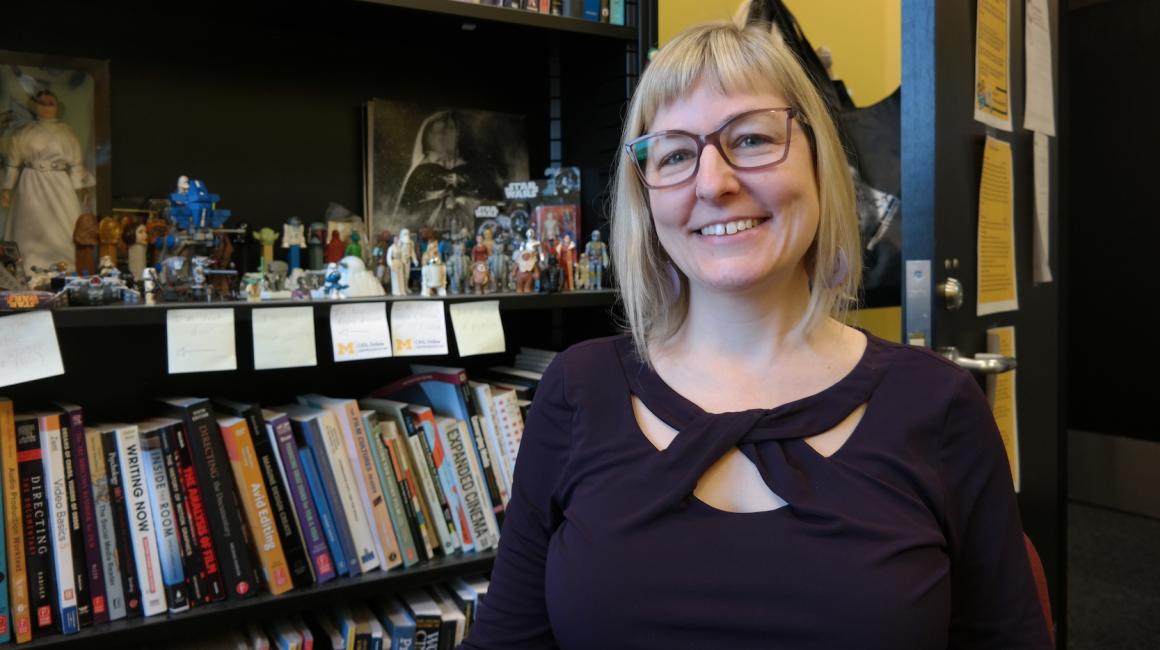
With a new hairstyle — a perm that didn’t go as expected — a young Jen Proctor walked into her junior high. As she cautiously strolled down the hall, a boy, the guy she had a crush on, laughed hysterically in her face.
“I was already self-conscious and his laughter made me feel horrible,” said the Journalism and Screen Studies associate professor. “It was a nightmare. I wanted to be invisible.”
That day happened years ago, but the memory of it remains strong. It’s a personal reminder — seeing how self esteem can be tied to appearance perception — of female adolescence.
When an adult Proctor saw YouTube videos uploaded by teens and tweens asking their viewers to evaluate them on appearance — dozens asking the question, “Am I pretty or ugly?” — and asking viewers to rate them in the comments, she recognized the force behind it. And she wanted to give voice to the often-experienced coming-of-age social pressure.
So Proctor created Am I Pretty?, a visually minimalistic film appropriating audio from approximately 20 of those YouTube videos.
“The platforms, the places to look for approval, are different from when I was that age, but it’s still about craving acceptance. I recognized that immediately,” said Proctor, who first watched the YouTube videos after the prevalence of them was the focus of a 2012 NPR story.
“Things I wanted to leave in the past — being teased because of appearance, hearing inappropriate comments about my young body or feeling uncomfortable when I knew I was being looked at — were dredged back up. It serves as a reminder, not that you ever really forget it, of how hurtful and confusing those years can be.”
Proctor said a common thread the speakers in the videos shared is the confidence they had as children. But as adolescents, the girls questioned themselves and used appearance as a worth measuring point.
We need to empower each other and serve as an example to young women — I say women because when I’ve screened the films in my classes, the women relate and the guys have said they didn’t experience anything like this — and show them that they can make it through,” she said. “And for people who weren’t aware of the effect a reaction can have, I hope viewing Am I Pretty? will help them reevaluate how they respond to images of young women.”
Proctor said she didn’t create a film when first watching the videos in 2012 because she needed to find a cinematic way to best represent the importance of what the girls were saying. But a little more than a year ago, Proctor figured it out: Remove the gaze so an audience cannot make visual judgments.
“It’s part of our nature to visually suss each other out. We try not to, but we do it all the time. So I removed the images of the young women; visually the viewer sees texture and color,” said Proctor, who was inspired after attending an absence of cinema panel at a Society For Cinema and Media Studies national conference. “The purpose is to call attention to the act of spectatorship invoked in these videos and what results when the visual basis for judgment is withheld — an acousmatic reduction through the denial of the promised image. What’s left for the audience are the girls’ words and the viewers’ reactions to the words.”
She said the short film isn’t just an experience acknowledgement piece; it also points to the same forces — the crossing of boundaries and harmful statements leading to lower self esteem — seen in abuse.
“These young women talk about comments people have made toward their appearance and call those people bullies. But as adults, we no longer call it bullying; we call it harassment,” Proctor said. “These young women are experiencing the foundation of harassment in their lives and we all know of the abuse that can be built on it. I hope this film serves as an important conversation starter.”
Am I Pretty? will be shown on campus on April 17 during the event “Negotiating Boundaries in the #MeToo Era.” The screening will take place in Fairlane Center South during the event’s lunch hour; discussion will follow.
The short experimental film also played at the Ann Arbor Film Festival this week and will screen at the Athens (Ohio) International Film and Video Festival in April.





